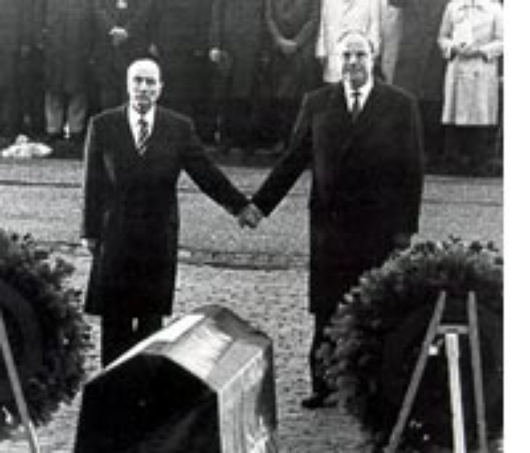Across the Rhine, through thick and thin
Published on
Translation by:
 ruth ahmedzai
ruth ahmedzai
Politically, Germany and France are pretty smoochy these days. But genuine romances are thinner on the ground. Here’s a look at the intimate world of the Franco-German love affair.
 Wasn’t it a lovely image that so unexpectedly appeared on our screens on 22 September 1984? A large, opulent man with his slender young companion at his side, hand in hand, rather stiff and edgy perhaps, but friendly and trusting nonetheless. That image had at first glance something touching, endearing about it. We were even more surprised to see that the two holding hands were the two most powerful men in Europe. But even a generation before that, Adenauer and de Gaulle had proven with their brotherly kiss that Franco-German relations are permeated with physical affection.
Wasn’t it a lovely image that so unexpectedly appeared on our screens on 22 September 1984? A large, opulent man with his slender young companion at his side, hand in hand, rather stiff and edgy perhaps, but friendly and trusting nonetheless. That image had at first glance something touching, endearing about it. We were even more surprised to see that the two holding hands were the two most powerful men in Europe. But even a generation before that, Adenauer and de Gaulle had proven with their brotherly kiss that Franco-German relations are permeated with physical affection.
German Pensiveness
It is thanks to the marvellous platonic relations between de Gaulle and Adenauer, Kohl and Mitterand, that romantic love between men and women has traversed the Rhine and that now there are as many German-French love matches as there is sand on the French Riviera. This is hardly surprising for Germans, given that most have for centuries regarded French women and men alike as the embodiment of the higher art of love. Neither need it surprise anyone that svelte blonde beauties like “Clodia Shiffair” and “Eidi Klum” have contributed to a considerable improvement in the reputation of German females on the other side of the Rhine. But what is a French lady with her sensuality to see in a German guy? Is it the female’s eternal search for security and stability that drives her into the arms of a disciplined, decent German worker? Or is it perhaps because of the German pensiveness, which gave the world great thinkers like Kant and Hegel? We’re told that Kant had such clear, blue eyes that he could easily have snared a Catherine Deneuve around his little finger.
Hot chocolate brioche dunking
So the German male is nowhere near as bad as reputation would have us believe: the women who have invested in him must be thinking of the long term. On the stock market of European lovers, the German is ranked as the most dependable investment fund. It’s hard to say whether the French women who bought into these bonds are happy with their investment choice years later though, as there is sadly no current long-term psychological research into the private lives of Franco-German partners. Insiders report, however, that the cultural hurdles that are to be overcome tend to be quite minor. Which is not to say that they should be underestimated.
A German will surely experience a mild culture shock when he sits down to breakfast for the first time with a French girlfriend, only to behold her dunking her marmalade smothered bread roll into her morning coffee. She on the other hand might take offence at the lack of fashion sense in her other half, though even that is in no way as widespread among German men as it is among their fellow gender in the land of Haute Couture. As for things culinary, the French female retains a preference for the vestiges of high culture, even when in other spheres her heart lies more on the left wing. A meal that diverges from the holy trinity of starter, main course and dessert will arouse an acute sense of deprivation and a German chap who hopes to entice his mademoiselle with an exquisite dinner, but forgets the dessert, will reap only a snide glare of disapproval from his beloved. Such dangers lurk also in Saturday nights out. German men should be on their guard if they want to invite the apple of their eye onto the dance floor - French ladies seem to still think of dancing as an old-time pair dance in the blessed 1950s’ style, and approaching one armed with a bottle of beer for a dance to the Strokes could pose a formidable threat to the multicultural household's harmony.
Angie and Nicolas
The political friendship between Germany and France is fortunately not plagued by these tribulations of day-to-day relations. Of course it’s not impossible that Gerhard Schroeder might wince at his good “friend Jacques” yet again dipping his croissant into his cocoa at breakfast in the Elysée Palace, but that does not pose a serious risk to the union between the countries. We still wait in vain for visionary change from the post-war political generation. But who knows what might happen if Nicolas Sarkozy becomes president and Angela Merkel the Chancellor? Perhaps then we’ll see them coyly holding hands at the foot of Montmartre, coming round full circle and bringing the political unity between the two countries finally to a climax.
Translated from Über den Rhein durch dick und dünn


